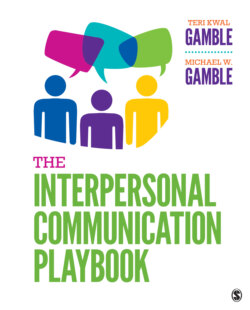Читать книгу The Interpersonal Communication Playbook - Teri Kwal Gamble - Страница 55
На сайте Литреса книга снята с продажи.
The Impact of Media and Technology
Оглавление“The medium is the message.” “The medium is the massage.” We can trace both of these sayings to the musings of the late media critic and communication theorist Marshall McLuhan. According to McLuhan, the channels of communication affect both the sending and the receiving of messages. The same words convey different messages depending on whether they are sent using face-to-face interaction, print, a cell phone, a video, or a podcast. The medium changes things, altering the message by massaging its contents.
It is now over half a century since McLuhan predicted that the introduction of new technologies would transform our world into a mobile global village.21 Technology makes it increasingly possible for us to watch and listen to, introduce ourselves to, and have continuing contact with individuals across the country and around the world without ever leaving our homes. Technology also is altering our sense of self, our social norms, our views of reality, our images of success and failure, our happiness, our interpersonal options, and the communication rules we adhere to. All these changes impact our communication presence.
Years ago, Apple’s Steve Jobs observed that computers really were personal and should be renamed “inter-personal computers.”22 Today we use computers, tablets, and smartphones to log on to Facebook, LinkedIn, Twitter, or an endless litany of other sites, to connect with others. In the year 2000, the average person spent 2.7 hours a week online. In 2010, that number jumped to 18 hours a week.23 In 2017, teens spent up to 9 hours a day on various social platforms.24 On average, in 2017, Americans spent 12 hours, 7 minutes a day consuming media, including radio and television.25 However, when we form a relationship online, we are likely to idealize and create heightened expectations for it, expectations that might not be realized should we actually meet. In fact, online partners feel greater intimacy with and attraction for one another than when they actually meet one another face-to-face.26 Have any of your online relationships developed into flourishing offline ones? To what do you attribute their success or failure?
Try This: What’s Okay With You?
What guidelines do you think people ought to follow when using electronically enhanced communication? For example, have you ever engaged in any of the behaviors identified in the chart below yourself? Would you become annoyed, insulted, or feel at risk if another person engaged in any of the identified behaviors? Use the chart to record your answers.
1 What rules, if any, would you advise we adhere to when using digitally enhanced communication?
2 What makes certain uses of digitally enhanced communication either acceptable or unacceptable in your eyes?
3 How would you react if a rule important to you were violated?
In addition to broadening the network of people we communicate with, technology makes it possible for those who experience communication apprehension when face-to-face with another person to connect without such fear. We can interact remotely or in person, be anonymous, someone else, or ourselves. If the choice were yours alone, would you opt to increase or decrease the number of your virtual interactions compared to those you experience face-to-face? Why?
As well as spending more time in the digital dimension, we also devote more time to viewing and talking about reality TV and other programs. As a result, our mediated experiences are influencing our real-life experiences and relationships. Mediated reality is often sexier or more violent than real life. Despite this, we sometimes try to apply what we learn from them to our own lives, only to end up disappointed. Our love affairs are rarely as poignant or as passionate as those in the media. Our friends are rarely as attractive, giving, or fun to be with as those we see depicted. Physicians and lawyers are rarely as successful treating or representing us as their fictional counterparts are. Somehow, real life falls short of the lives we encounter either online or via television and film.
Years back, parents used to cajole, “Turn off the TV.” Their plea has now changed to something like “Turn off the device and come watch television.” Or are your parents as plugged into Facebook and other apps as you are? Do you or they take the smartphone to bed as you once did a stuffed animal? The claims we make about Internet addiction, while much like the claims people used to make about television being a plug-in drug, are being taken seriously by consumers and creators alike. Might you be addicted to your device? Facebook, Instagram, and Twitter are hypnotically compelling for many of us, in part because they deliver unscheduled “variable rewards”—much like slot machines do. Messages, alerts, notifications, photos, and “likes” are sent to us randomly, making it virtually impossible for us not to react to them. They induce large numbers of us to become compulsive site checkers looking for a dopamine boost—almost as if we were seeking a fix.
Quite simply, a machine is altering our consciousness and the nature of our interpersonal interactions.27 We need to think about that. In coming chapters, we will look at the extent to which our devices are personalizing or depersonalizing our contacts, improving or harming communication with friends and family members, and fostering or impeding the development of what we call a community. When immersed in the digital domain, for example, do you gravitate toward cliques of people who share your interests, or do you seek to widen and diversify your interpersonal circle?
How are phones affecting relationships?
altrendo images/Stockbyte/Thinkstock
